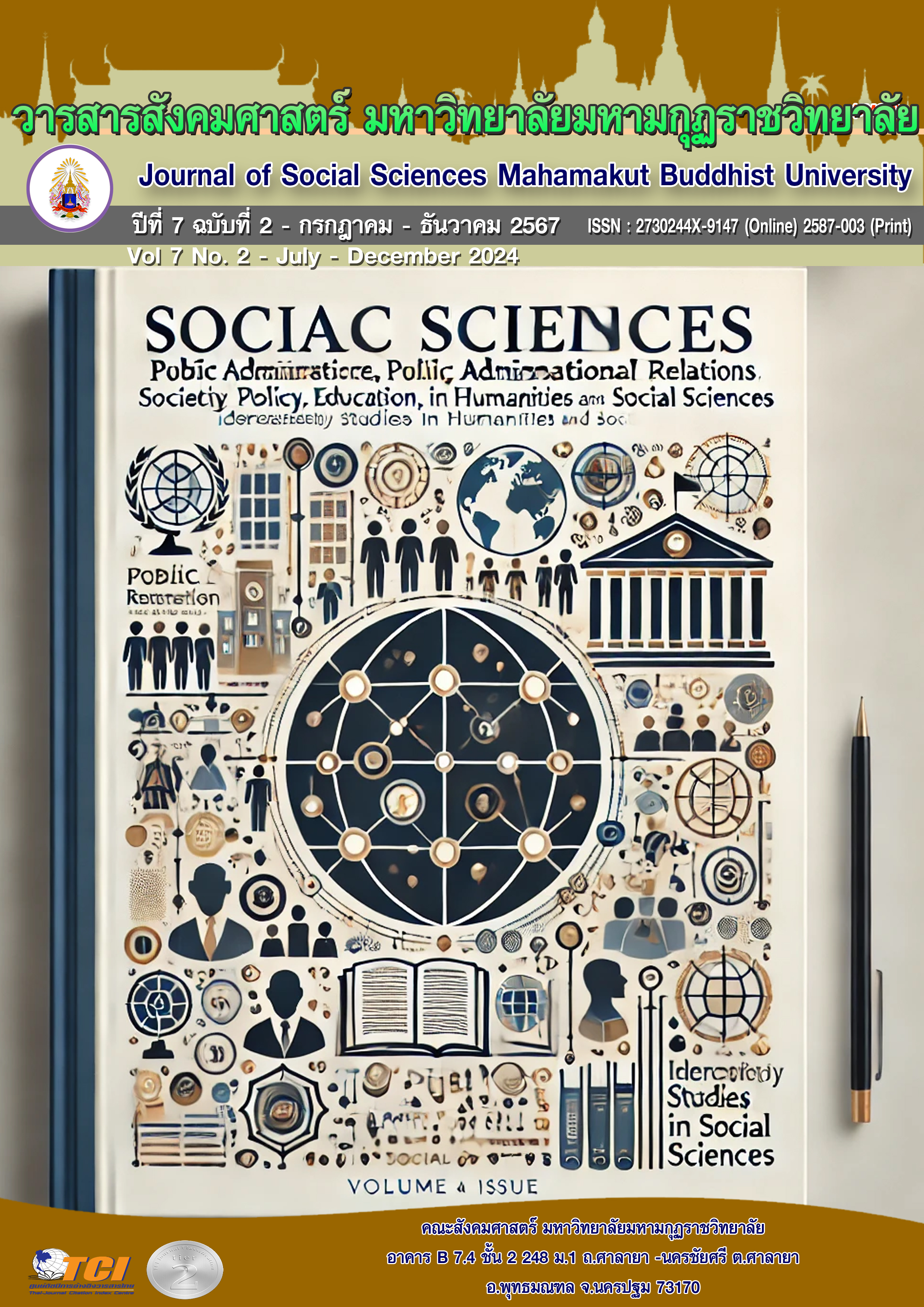คุณลักษณะของผู้เรียนที่พึงประสงค์ในทศวรรษหน้า
คำสำคัญ:
คุณลักษณะของผู้เรียนในในทศวรรษหน้า, กระแสโลกาภิวัตน์, นโยบายจัดการศึกษาบทคัดย่อ
บทความบทนี้นำเสนอแนวคิดในการจัดการศึกษาไทยในวันนี้และในอนาคตสำหรับนักการศึกษาที่สนใจในการเสริมสร้างคุณลักษณะของผู้เรียน ในทศตวรรษที่กำลังจะมาถึงนี้ การศึกษาไทยจะสามารถกำหนดคุณลักษณะของผู้เรียนที่เหมาะสมดังกล่าวได้ นักการศึกษาไทยจะต้องมีกรอบในการทำความเข้าใจปัจจัยหลักที่มีผลต่อการเปลี่ยนแปลงของโลกใบนี้ ไม่ว่าจะเป็นด้านเศรษฐกิจ การเมือง สังคมและวัฒนธรรม ความเข้าใจดังกล่าวจะมีผลต่อการกำหนดนโยบายการศึกษาที่มุ่งส่งเสริมคุณลักษณะที่จำเป็นต่อการใช้ชีวิตของผู้เรียนใน ศตวรรษหน้า บทความนี้ยังนำเสนอ นโยบายการจัดการศึกษาของประเทศที่พัฒนาแล้วเพื่อใช้เป็นข้อมูลในการสนับสนุนแนวคิดดังกล่าว ผู้เขียนหวังว่า บทความนี้จะชี้ให้ผู้ที่เกี่ยวข้องได้เห็นความสำคัญของการศึกษาปัจจัยหลักที่มีผลกระทบต่อการจัดการศึกษาและนำความเข้าใจดังกล่าวมาสร้างกรอบนโยบายในการกำหนดคุณลักษณะของผู้เรียน ให้สอดรับกับการเปลี่ยนแปลงในศตวรรษหน้า เพื่อให้ผู้เรียนเหล่านั้น สามารถดำรงตนได้อย่างมีความสุขและเป็นประชากรที่มีคุณภาพและพัฒนาประเทศได้อย่างยั่งยืน
เอกสารอ้างอิง
กัญภร เอี่ยมพญา. (2561). การพัฒนาวิชาชีพครู. นนทบุรี: 21 เซ็นจูรี่.
เกรียงศักดิ์ เจริญวงศ์ศักดิ์. (2560). การศึกษาบนฐานโลกาภิวัฒน์ : กรณีการจัดการศึกษาฮาร์วาร์ดได้. สยามรัฐสัปดาห์วิจารณ์ ปีที่ 65 ฉบับที่ 14 วันศุกร์ 15 – พฤหัสบดี 21 ธันวาคม 2560.
ทิศนา แขมมณี. (2555). ศาสตร์การสอน : องค์ความร้เพื$อการจัดกระบวนการเรียนรู้ที่มีประสิทธิภาพ. กรุงเทพมหานคร: จุฬาลงกรณ์มหาวิทยาลัย.
นิวัตต์ น้อยมณี. (2562). การศึกษาไทยกับยุคโลกาภิวัตน์. ฉะเชิงเทรา: สำนักงานเขตพื้นที่การศึกษา มัธยมศึกษา เขต 6.
ไพฑูรย์ สินลารัตน์ และ นักรบ หมี้แสน. (2560). ครุศึกษาและการพัฒนาวิชาชีพครู. กรุงเทพมหานคร: สำนักพิมพ์แห่งจุฬาลงกรณ์มหาวิทยาลัย.
วิจารณ์ พานิช. (2555). วิถีสร้างการเรียนร้เพื่อศิษย์ในศตวรรษที่ ู 21. กรุงเทพมหานคร: มูลนิธิสดศรี- สฤษดิ์วงศ์.
สำนักงานเขตพื้นที่การศึกษามัธยมศึกษา เขต 1 (2553). การประกันคุณภาพการศึกษา สู่คุณภาพมาตรฐานที่เป็นเลิศ, สำนักงานคณะกรรมการการศึกษาขั้นพื้นฐาน.
Biddle, S. (2002). Internalization: Rhetoric or Reality? ACLS Occasional Paper No. 56, American Council.
Chinnammai, S. (2005). Effects Of Globalization on Education and Culture. ICDE International Conference. [report] Madras, India.: University of Madras, pp. 1-6.
Dede, C. (2009a). Determining, developing, and assessing the skills of North Carolina’s future-ready students. Friday Institute White Paper Series, Number 2 (May). www.fi.ncsu. edu/whitepapers.
Fischer, S. (2003). Capital Account Liberalization and the Role of the IMF, Princeton Essays in International Finance (207)ม 1-10.
Giddens, A. (1990). The Consequences of Modernity. Cambridge, UK: Polity Press.
Green, A., Little, A., Kamat, S., Oketch, M. & Vickers, E. (2007). Education and Development in a Global Era: Strategies for Successful Globalization. London: DfId.
Held, D. & McGrew, A. (Eds.). (2000). The Global Transformation Reader: An Introduction to the Globalization Debate. 2nd Ed. Cambridge: Polity Press.
Hoa, N. (n.d.). Sustainable Education development under Globalization and the Reforms of Teaching and Learning Methods in Teacher Training. Retrieved from
http://www.grips.ac.jp/VDFTokyo/Doc/socialBook1Chapter5.pdf. (Access date:2 January, 2011).
Karoly, L. A. (2004). The 21st century at work: Forces shaping the future workforce and workplace in the United States. Santa Monica, CA: RAND Corporation.
Kobus, D. K. (1992), `Multicultural/global education: an educational agenda for the rights of the child', Social Education 56 (4), 224-7.
Levy, F. & Murnane, R. J. (2004). The new division of labor: How computers are creating the next job market. Princeton, NJ: Princeton University Press.
Ministry of Education, Canada (2010). Inspiring action on education, Edmonton, Alberta. Accessed at http://www.oecd.org/site/eduilebanff/48763522.pdf on 14 March, 2016.
Ministry of Education, Singapore, (2015). 21st Century Competencies. Accessed at https://www.moe.gov.sg/education/education-system/21st-century-competencies on 24 March, 2016.
Memon, G. R., (2001), “Education in Pakistan: The Key Issues, Problems and the New Challenges”, Journal of Management and Social Sciences, Volume 3,(1), 47-55.
Ohmae, K. (1990). The Borderless World. London: Collins.
Öztürk, ·I H. 2011. “Curriculum Reform and Teacher Autonomy in Turkey: The Case of the History Teaching.” International Journal of Instruction 4, no 2: 113–28. Available at www.e-iji.net/dosyalar/iji_2011_2_7.pdf (accessed June 2013).
Partnership for 21st Century Learning (2007). Framework for 21st Century Learning, Massachusetts Avenue NW, Suite 700 Washington, DC 20001. www.P21.org
Pennycook, A. (2006). Global Englishes and transcultural flows. New York: Routledge.
Robertson, R. (1992). Globalization: Social Theory and Global Culture. Sage, London.
Simmons, S. S., and Strenecky, B. J. (1996), `Semester at sea: a vehicle for global education', Multicultural Review 4 (1), 37-40.
Suarez-Orozco & Qin-Hilliard (2007). Globalization: Culture and Education in the New Millennium. Berkeley: University of California press.
Stromquist, N. P. & Monkman, K. (Eds.). (2000). Globalization and Education: Integration and Contestation Across Cultures. Lanham MD: Rowman & Littlefield Publishers, Inc.
Tikly, L. (2001). Globalisation and education in the postcolonial world: Towards a conceptual framework. Comparative Education, 37 (2), 151–171.
Tye, K. A., and Kniep, W. M. (1991), `Global education around the world', Educational Leadership 48 (7), 47-49.
Urch, G. E. (1992), `Global education: the time is now', Educational Horizons 7 (1), 15-17.
Waters, M. (1995). Globalization. London: Routledge.





